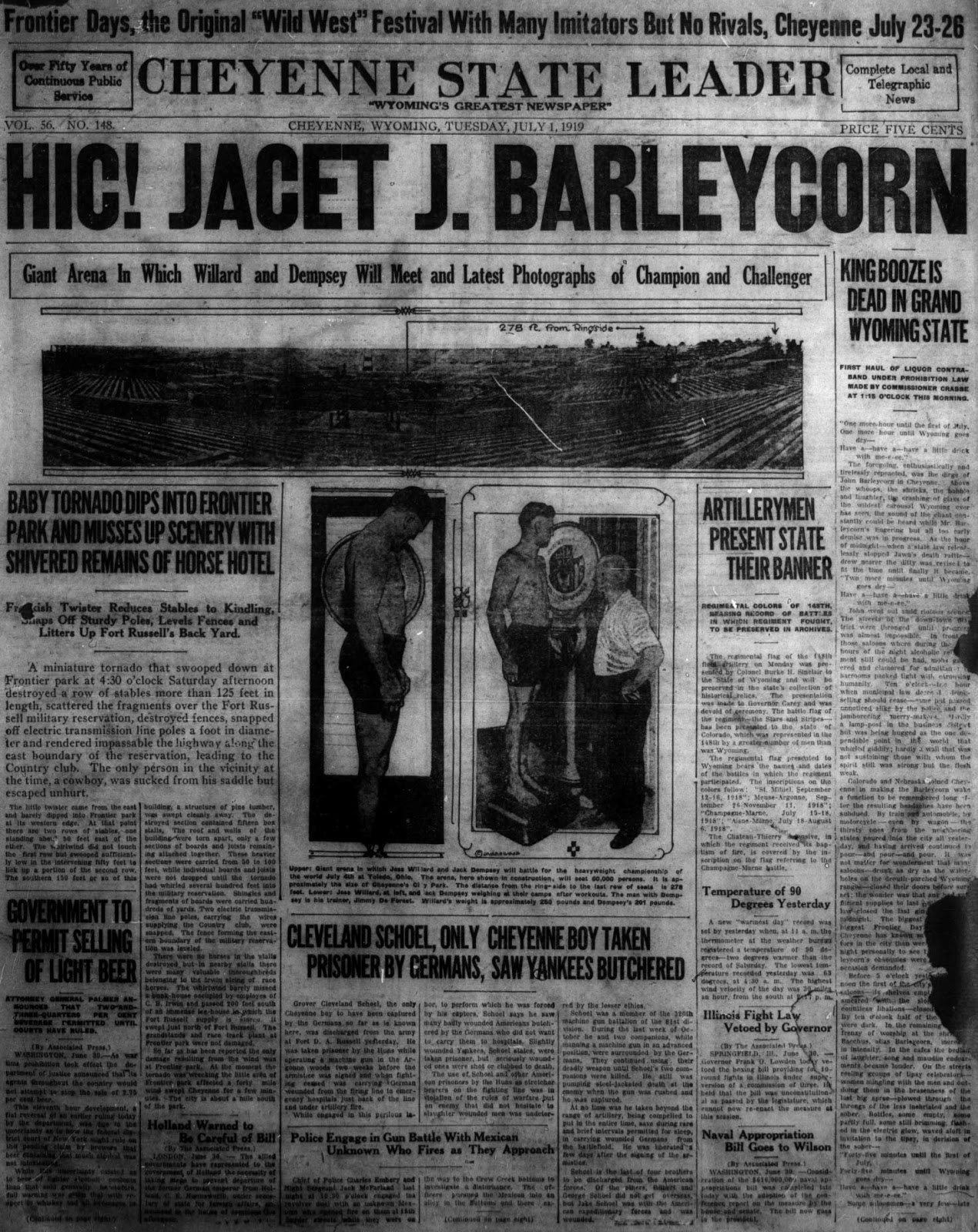Today is Canada Day
It may seem odd to note this, but Wyoming has a strong connection with Canada. Some of the state's early significant figures were Canadians, such as Tom Beau Soleil (Tom Sun). The city of Casper was placed by merchants, one of whom was a Canadian. Prior to statehood, Canadian metis travelled as far south as Wyoming's Powder River Basin, and during the early ranching days Wyoming cowboys ranged into Alberta for work.
1861 The first stagecoaches to use the Northern (Central) Route via Forts Kearny, Laramie and Bridger began to use that route, which was no doubt rather dangerous at the time. Attribution: On This Day.
1862 The US outlawed polygamy by way of the Morrill Anti-Bigamy Act which also granted large tracts of public land to the states with the directive to sell for the support of institutions teaching the mechanical and agricultural arts. It also obligated state male university students to military training. The education initiative resulted in 68 land-grant colleges. This act lead directly to the University of Wyoming (the land grant part, obviously).
The polygamy part of this was fairly obviously aimed at Mormon communities, principally in Utah but also in neighboring states.
1898 The pivitol battle of the Spanish American War, the Battle of El Canay and San Juan Heights, sees the 1st U.S. Volunteer Cavalry,lead at that time by its former second in command, Theodore Roosevelt, the 17th U.S. Infantry, 10th U.S. Infantry, 21st U.S. Infantry, 13th U.S. Infantry, and the 10th U.S. Cavalry, prevail. While Wyoming's 2nd Volunteer Cavalry remained in the United States, this epic event does have some association with Wyoming, as some of the participants did. It also saw the completion of Theodore Roosevelt's rise to hero status, something that was particularly the case in the West. Also, there were a number of Wyoming citizens in the 1st U.S. Volunteer Cavalry, and one Wyoming native in the 10th U.S. Cavalry and another in the 17th U.S. Infantry whose performance in action that day was quite notable. The 10th U.S. Cavalry, it should be noted, was a segregated (ie., black) unit, whose officers were white, but whose enlisted men were black.
1st U.S. Volunteer Cavalry
Medal of Honor Citations from this event associated with Wyoming:
BAKER, EDWARD L., JR. Sergeant Major, 10th U.S. Cavalry. Place and date: At Santiago, Cuba, 1 July 1898. Birth: Laramie County, Wyo. Date of issue: 3 July 1902. Citation: Left cover and, under fire, rescued a wounded comrade from drowning.
Baker is a very unusual example of a black soldier in the segregated Army as he was promoted to the rank of Captain following the Spanish American War and retired at that rank in 1902. He was in a command position, at that rank, in the 49th Infantry.
ROBERTS, CHARLES D.Second Lieutenant, U.S. Army, 17th U.S. Infantry. Place and date: At El Caney, Cuba, 1 July 1898. Entered service at: Fort D. A. Russell, Wyo. Birth: Fort D. A. Russell, Wyo. Date of issue: 21 June 1899. Citation: Gallantly assisted in the rescue of the wounded from in front of the lines under heavy fire of the enemy.
1916 Dwight and Mamie Eisenhower, married on this date in 1916 in Denver.
The Eisenhower's at his duty station in San Antonio, 1916.
On this date, in 1916, Dwight and Mamie Eisenhower wed in Denver
Colorado, her hometown. She was 19 years old, and he was 25. The
wedding took place at her parents home and was presided over by a
Presbyterian minister. The couple met in San Antonio where she was
attending finishing school, and where the family also wintered. Her
father was a meat packing executive for Doud & Montgomery and had
retired at age 36. Dwight Eisenhower was, of course, a serving office
in the U.S. Army. An excellent training officer, Eisenhower was not
assigned a role that lead in his entering Mexico during the Punitive
Expedition, and indeed he remained in the United States in a training
role during World War One.
1919. Wyoming's state prohibition act went into effect. I can't help but note that Prohibition went into effect immediately prior to the big 4th of July Holiday.
And of course, Wartime Prohibition ironically went into effect on the same day, although exactly what it prohibited remained unclear.
The Wyoming State Tribune took the occasion to have a really unusual front page, framed by a cartoon, the only example of that I've ever seen.
Casper noted John Barleycorn's passing for all time (the papers had persistently been, we'd note, on the "right side of history" on this one, i.e., for Prohibition and its inevitable triumph, but also noted the big July 4th celebration it was planning, which would stretch over three days.
The Cheyenne State Tribune was still featuring the Dempsey fight and advertising its upcoming Frontier Days.
The always sober Laramie Boomerang didn't even note the arrival of state prohibition.
1920 A parachutist died due to a parachute failure, above the Casper airport. Attribution: Wyoming State Historical Society.
1931 The USS Wyoming BM-10 was redesignated as AG-17. Attribution: On This Day.
1955 The LST-1077 renamed the USS Park County.
1963 The 90th Missile Wing was activated at Warren Air Force Base.Attribution: On This Day.
2014 A special legislative committee of the Wyoming of the Wyoming Legislature has released its draft report finding that Education Secretary Hill is culpable of misconduct in her office which rise to the level of making her liable to impeachment. She will have fifteen days to comment on the draft, after which the final report will be issued.
As Hill is leaving off and has only six months left on her term, it would seem unlikely that the Legislature will convene in a special session to consider a bill of impeachment. Hill is presently a Republican candidate for the governor's office where she is running against incumbent Republican governor Matt Mead.


.jpg)





No comments:
Post a Comment